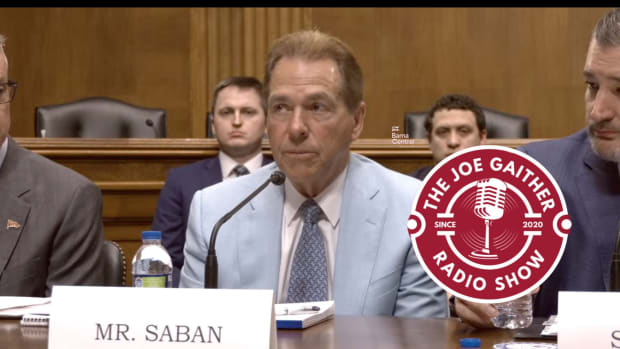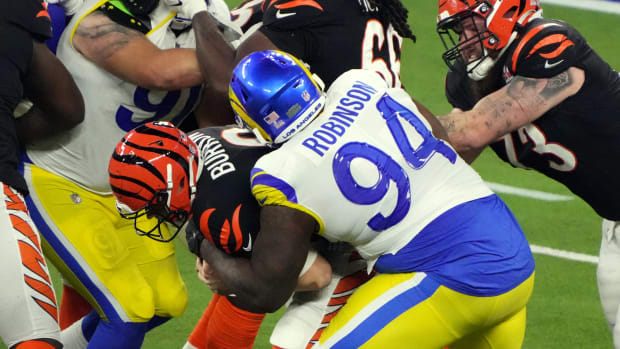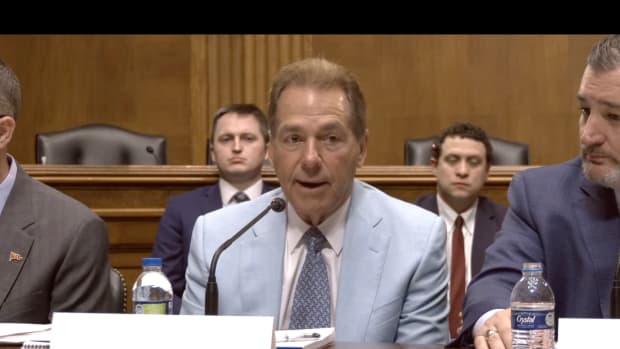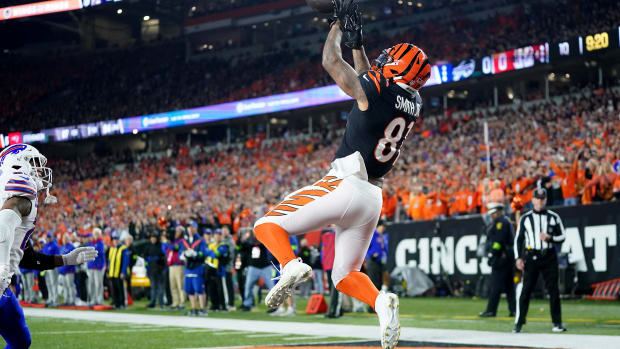Wendall Hudson the Perfect Choice for the First Retired Jersey at Alabama
TUSCALOOSA, Ala. — There was a lot of love in the room.
If you’ve ever been fortunate enough to meet Wendell Hudson, or have gotten to know him even a little, that’s not a surprise. He just has that effect on people.
Only this almost looked like a scene out of a wedding, like when one realizes that the collection of people would probably never be side-by-side ever again. From former high school teammates he hasn't seen in years to players coached, the Rast Room at the Bryant Conference Center was wall-to-wall smiles and also some tears (of joy) as speaker after speaker got emotional at the podium Friday afternoon.
That included Hudson.
“What this all about to me is you people here: Friendship,” Hudson said when it was finally his turn to talk, and no one doubted that he meant it with all his heart.
On the 50th anniversary of Hudson becoming the first African-American to receive an athletic scholarship, the University of Alabama tipped off its weekend celebration of its favorite son with the “Tribute to a Trailblazer” luncheon.
Saturday, when Alabama hosts No. 25 LSU in men’s basketball at Coleman Coliseum (3 p.m., ESPN2), Hudson will become the first person in Crimson Tide history to have his jersey officially retired.
It’s an honor that when first told Hudson paused, fully understanding its magnitude. It takes a lot to make him speechless, and the man who has had “no excuses” as his mantra is still a little overwhelmed by it all.
But that’s just Wendell, and only adds to what makes him so special.
Among those who wouldn’t have missed this weekend for anything were Sylvester Croom, the former Alabama All-American who became the first black head football coach in Southeastern Conference history.
The speakers included former basketball coach Wimp Sanderson, former teammates Glenn Garrett and Leon Douglas, and one of his former players, Tierney Jenkins, as Hudson was the school's first African-American coach as well.
They laughed. They told stories. They talked about the impact Wendell had on their lives, like the master of ceremonies, basketball announcer Chris Stewart, mentioning about how one of his kids is named Hudson.
Douglas, a center during his playing days, spoke at length about how he was supposed to be the big man on the team after arriving, but Hudson blocked everything he shot the first few days. That made him think about a few things.
He also told about how he was shunned by everyone at Colbert County High School and in his hometown of Leighton, Ala., for signing with the Crimson Tide. George Wallace’s Stand in the Schoolhouse Door in 1963 was still fresh in everyone’s minds, along with numerous other race-related incidents.
Not even they could stem the Tide of integration.
“It was not easy for me,” Douglas said. “I always look at him and think about how he was by himself. I had a group with me.”
Former basketball coach C.M. Newton, who was promised when being hired by athletic director Paul W. “Bear” Bryant that there would be no restrictions on his roster, always maintained that Alabama didn’t necessarily go looking for Hudson, but that he was the right person to be the first.
“It was not a courageous effort for us to offer Wendell Hudson a scholarship,” Newton once told me. “It was a tremendous act for him to accept it.”
Had Hudson not worked out the worst that would have happened to Newton was a trip back to someplace like Transylvania College in Kentucky (where he also integrated the program).
“I just wanted to play, because I could play,” Hudson said.
He fully gets it now, and better than anyone else.
Running back Wilbur Jackson (1971-73) was the first African-American to accept a football scholarship at Alabama. Offensive lineman John Mitchell (1971-73) was the first to play.
Helping pave their way were the five black walk-on players who participated in the 1967 spring practices: Dock Rone, Arthur Dunning, Melvin Leverett, Andrew Pernell and Jerome Tucker.
But Hudson was the pioneer.
“There’s nobody who understands, because he’s the first,” Croom said as part of a video tribute.
Hudson didn’t have trouble on his own team, and not too much on campus. Road games were another matter, though.
The worst was at Ole Miss, where the fans were so vicious and vulgar, Hudson’s teammates were ready to take matters into their own hands. He asked them not to. "Let’s play basketball."
Instead, the officials called five quick fouls and got him out of the game. It was even worse because they took away the only way he had of answering.
“Change is not a bad thing,” Hudson said was what he learned over the years. “But it can be hard.”
Of course, he got the last laugh on so many levels. His high school team won the first integrated state championship. He averaged 19.0 points and 12.9 rebounds over his Crimson Tide career and was named the SEC Player of the Year (1972-73), the first Alabama player to land the award. He became an assistant coach, both at Alabama (1974-79) and, believe it or not, Ole Miss (1983-85).
Meanwhile, the players who followed him also made their mark, including T.R. Dunn, Charlie Russell, Charles Cleveland, Leonard, Anthony Murray, Rickey Brown, Reggie King …
Fifty years later, they’re still coming.
“He paid the way for guys like me,” said sophomore guard Kira Lewis Jr., who was recruited out of Meridianville, Ala., and is leading this year's Crimson Tide in scoring. “Without him, I’m probably not here.”
That makes his impact immeasurable, which brings us back to love.
Outside of basketball, Hudson's passions include his family, traveling and food, which have all developed over the years and continue to help tell his story.
When Hudson originally said yes to Alabama all those years ago, his low-key signing party in the heart of Birmingham included just Kool-Aid and cookies.
The first time he walked into the Bryant Hall cafeteria to eat with the other athletes, the closer he got to the meal being served the quieter the room became. But then he noticed that all of the workers, who were black, were all smiling. They piled up his plate like he was boxer Deontay Wilder trying to gain some extra weight for his upcoming heavyweight title bout.
Friday, when Hudson was being honored, even the icing on the deserts looked absolutely pristine and delicious.
Alabama had been talking about retiring the first jersey in program history for more than a year, and once the decision was made there really was no debate about which number would be hoisted to the rafters.
"He was the obvious choice," athletic director Greg Byrne said.
Alabama had to get it right, and it did.
No excuses.




